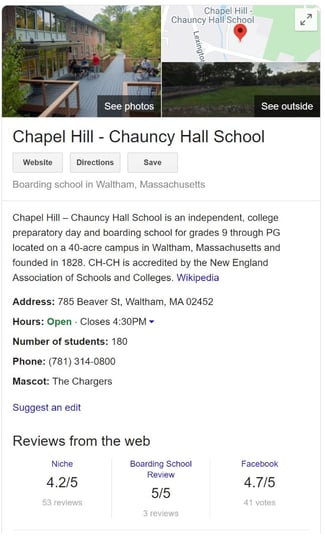Is your school dealing with a persnickety review or low star rating? It can be challenging to keep up with various ways in which prospective families are searching for, and learning about your school online while understanding which of those ratings really matter. For better or worse, the reality is that online reviews are part of the equation for every stage of the funnel -- from the initial discovery and inquiry, to deciding whether to visit, apply, and ultimately enroll -- key considerations are being made by adults who rely on the internet for a large source of information.

Online reviews matter. Here is how schools can manage them.
Online reviews for schools is increasingly important. In fact, according to Bright Local, 91% of 18-34 year olds trust online reviews as much as personal recommendations. That means, with a growing millennial parent audience, reviews are likely going to hold even greater weight in that already competitive digital landscape, where internet users are not only more comfortable trusting reviews than ever before, they are also contributing their own.
Which review websites matter most for independent schools?
 Analyze what your Google My Business profile says about your school (that knowledge graph and map that appear on Google when someone queries your school), and what users are saying about your school via the customer-generated content and reviews. After Google, other channels that hold weight for private PK-12 schools include Facebook, Bing Places, PrivateSchoolReview.com, GreatSchools.org, Niche.com, as well as BoardingSchoolReview.com and other school-search sites.
Analyze what your Google My Business profile says about your school (that knowledge graph and map that appear on Google when someone queries your school), and what users are saying about your school via the customer-generated content and reviews. After Google, other channels that hold weight for private PK-12 schools include Facebook, Bing Places, PrivateSchoolReview.com, GreatSchools.org, Niche.com, as well as BoardingSchoolReview.com and other school-search sites.Here are the Do’s and Don't of managing bad reviews for schools.
Don’t just remove bad reviews
If the review is defamatory, or simply untrue, you can try to remove it or flag it, which puts the pressure on the platform itself, aka Google, Niche, etc. to consider removing it. The process varies by platform but generally a defamatory review, or one that is clearly not a true depiction of your school, or obviously not from a reliable user, might get removed after a week or so. However, fake bad reviews are rare. What’s more common, and troublesome for schools, is if someone has an authentic, truly negative opinion of your school, and leaves a bad review or low star rating as a result. In those cases, flagging it will not help, and simply trying to remove it is not the right thing to do.
Don’t hide from bad reviews, either
Instead of trying to remove or flag truly bad reviews, you don’t want to ignore them either. See this poor review as a learning opportunity for your school -- an opportunity to address it directly with individual and inform others who are seeing it. It is possible to turn a bad review into a good review! Work with marketing, admissions and leadership to determine the appropriate response. It can be as simple as acknowledging the user’s review was seen by replying to their review. Publicly thank them, and let them know if measures are being taken to address or correct that type of experience from happening in the future (if true). This will show your audience that although there were some obstacles, your organization is willing to work with everyone to resolve conflict.
If a public response is not appropriate, considering talking to that user directly, and explaining that you recognize their experience, what’s being done in support of that, and even go as far as to ask them if they would be willing to remove that review if it’s negatively impacting the community (if true). You might be surprised to see that in some cases, once someone feels their complaint is heard and validated, they are more likely to remove it themselves. However, this is not always an appropriate method, and could add fuel to the fire in particularly sensitive issues.
How can my school get more positive reviews?
Bright Local survey concluded that 68% of consumers will leave a review if asked. This means, there's a good chance schools can get positive reviews generated and rising to the top, which will push those negative reviews down. However, it’s not as easy as just asking everyone to leave a review. Just as you need a plan of action for monitoring and responding to reviews, you need one for soliciting positive ones. The good news? Enroll Media Group and other resources are available for schools to help figure out a positive review solicitation plan. Here are some tips for getting started on generating positive reviews.
Don’t leave the job to marketing alone
Get the whole community involved in reviewing your organization! Admissions, enrollment management and even the Head of School and other members of leadership as well as staff, current students, alumni and ambassadors should all work with marketing to acquire more reviews. Marketing alone cannot tackle all of the opportunities, set goals, monitor, respond to reviews, as well as solicit new ones. It's a team effort. There are also third party tools that can help monitor reviews and automate workflows. An outside perspective can also help determine priority platforms and develop a workflow based on your current online reputation.
Don’t ask anyone and everyone to leave a review
Instead, analyze the areas of weakness in your current reviews or identify the current grades seeking a little extra help in admissions. Maybe boarding school and residential life have the most criticism online, or preschool has the most parents leaving poor reviews, versus positive ones. Identify these areas of risk, and ask ambassadors, students, staff, alumni from those respective areas, to leave reviews.
Don’t be vague in your request for a review
For the highest response rate, provide detailed instructions with shortcut links to the specific websites you would like them to leave their review. Provide an example of other reviews so that the user feels comfortable being a part of it. Email is a great channel for these requests!
Don’t ask for a positive review
Assuming you’ve carefully chosen the people from whom you are seeking reviews, do not ask them to leave you a 5-star rating. Better yet, ask for a true, authentic review of their experience as it relates to the specific segment of school you need one. Let them know how important it is for the school that prospective families and members of the community read about their experience. If you’ve skillfully crafted the right requests to the right people, they will likely leave a strong review and high star rating on their own accord!
Don’t ask for reviews all at once
Timing is everything in marketing. While it's easy to want to check the requests of your list, you need to strategically stagger the review requests so that they don’t hit all at once for any one platform, and look rehearsed.
Reviews matter, and so does your organization's reputation. There is never a bad time to get started on working on reviews as part of your online reputation management strategy. For more information on review best practices for private day and boarding schools, reach out to Enroll Media Group. Or if you’re at TABS this week in Boston - check out our speed session with Chapel Hill-Chauncy Hall, to get more hands-on practical tips like these to ensure your school is set up for a successful reputation management strategy in 2020.

